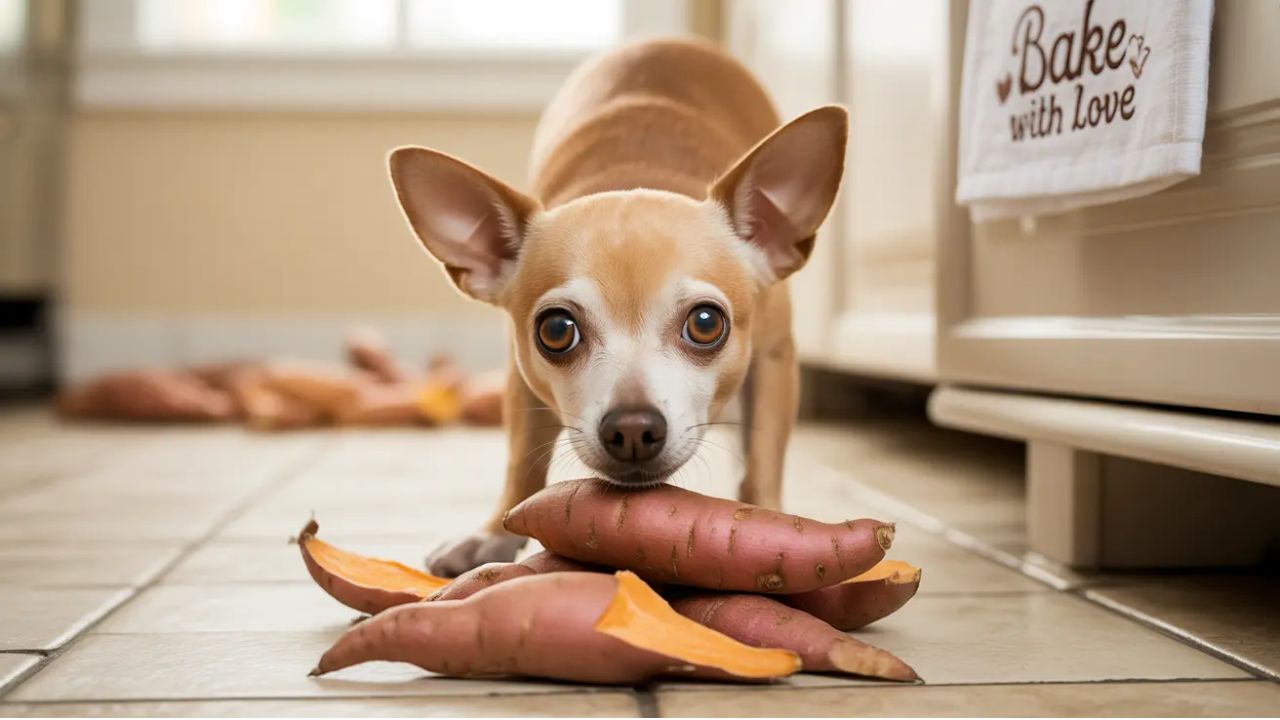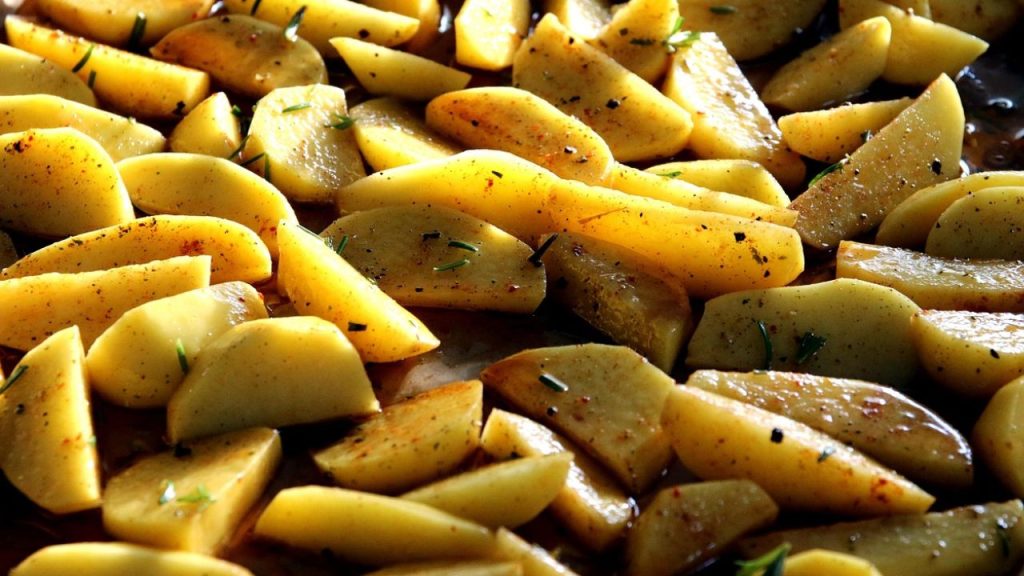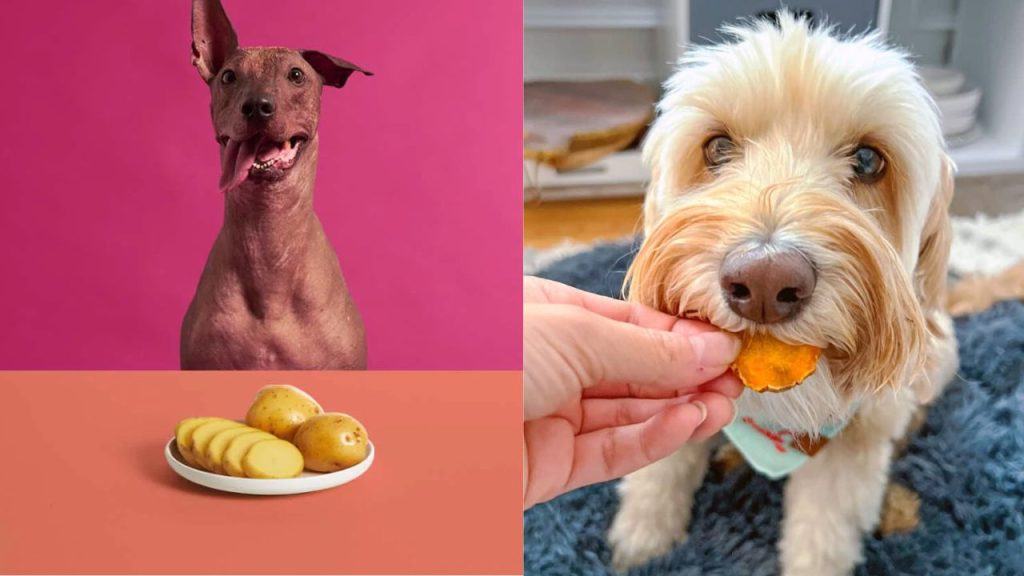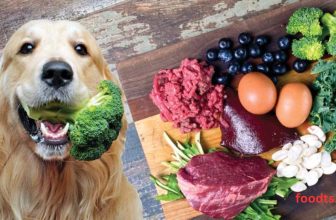Can Dogs Eat Potato Skins? Safe Feeding Guide

You might be preparing a delicious meal and wondering if your furry friend can share in the joy. Potatoes are a staple in many kitchens, but what about those leftover skins?
Can dogs eat potato skins safely, or are they better left in the compost bin? You love your dog and want to make sure they’re healthy and happy. By the end of this article, you’ll know whether sharing those tasty potato scraps is a good idea.
You’ll discover surprising insights that could change how you treat your dog’s diet forever. Keep reading, because your dog’s health could depend on it.
Potato Skin Basics
Potato skins are a common part of our meals. Many dog owners wonder if they are safe for their pets. While potatoes are a regular ingredient in dog food, the skins might be different. This guide will explain what you need to know about potato skins and dogs.
Potato skins contain solanine, a chemical that can be harmful to dogs. In large amounts, solanine can cause stomach issues and other health problems. It’s important to limit your dog’s intake of potato skins.
Health Benefits
While potato skins have some nutrients, they are not the best source for dogs. They contain fiber and vitamins, but not enough to outweigh the risks. Offering other vegetables is a safer option for your dog’s nutrition.
Preparation Tips
If you decide to feed potato skins, make sure they are cooked and unseasoned. Raw skins can be more harmful. Avoid adding salt, butter, or spices, as they can upset your dog’s stomach.
Safe Alternatives
- Carrots – Crunchy and low in calories.
- Green beans – High in fiber and vitamins.
- Sweet potatoes – Nutritious and easy to digest.
Nutritional Value
Potato skins are often considered tasty and nutritious for humans. But can dogs eat them? Understanding the nutritional value of potato skins is crucial. It helps determine if they are a safe treat for our furry friends. Dogs have different dietary needs compared to humans. Knowing what benefits or risks potato skins might offer is important.
Vitamins And Minerals
Potato skins are rich in vitamins and minerals. They contain vitamin B6, which is important for brain health. They also have potassium, which aids in muscle function. These nutrients can benefit dogs if given in moderation.
Fiber Content
High fiber content is another feature of potato skins. Fiber is crucial for digestive health. It helps keep the digestive system moving smoothly. But too much fiber can lead to tummy troubles. It’s best to offer small amounts to avoid issues.
While potato skins have nutrients, there are potential risks. They can contain pesticides if not washed properly. Unwashed skin might cause health issues. Also, solanine is present in green potato skins. This compound is toxic to dogs. It’s essential to check the skin before serving.
Serving Suggestions
- Ensure skins are washed thoroughly.
- Offer skins in small pieces.
- Avoid feeding green or sprouted skins.
- Mix skins with other dog-friendly foods.
Potential Risks
Dogs are curious creatures and often explore their world by tasting things. Potato skins are among the many foods dog owners wonder about. While potatoes offer some nutritional benefits, the skins might not be as safe. Understanding the potential risks of feeding your dog potato skins is vital for their health. This article explores the possible dangers, including solanine toxicity, digestive issues, and allergic reactions.

Solanine Toxicity
Potatoes belong to the nightshade family, which contains solanine. Solanine is a natural chemical that can be toxic. Dogs are at risk if they eat large amounts of potato skins. Symptoms of solanine poisoning include:
- Vomiting
- Diarrhea
- Lethargy
- Tremors
- Seizures
Green or sprouted potato skins are more dangerous. They contain higher levels of solanine. Even small amounts can cause problems. It’s crucial to keep your dog away from these. If you suspect solanine poisoning, contact your vet immediately. Quick action can prevent serious harm.
Digestive Issues
Potato skins are hard to digest. They can cause stomach upset in dogs. Common symptoms include nausea and diarrhea. Dogs with sensitive stomachs are more likely to be affected. The skins can also lead to blockages in the intestines. This is especially true for small dogs. Blockages can be life-threatening and require surgery.
Cooking potato skins may reduce the risk of digestive issues. However, it does not eliminate it. Feeding your dog peeled potatoes is a safer option. Always monitor your dog’s reaction when introducing new foods. A small piece can help you see if there are any adverse effects.
Allergic Reactions
Just like humans, dogs can have allergies. Potato skins might trigger allergic reactions. These reactions can vary in severity. Symptoms to watch for include:
- Itchy skin
- Hives
- Swelling
- Breathing difficulties
If your dog shows any signs of an allergic reaction, visit your vet. Prompt treatment is essential for their well-being. An allergy test can help determine if potatoes are the cause. Always be cautious when introducing new foods to your dog’s diet.
Safe Preparation Methods
Potato skins are a popular snack for humans, but can dogs safely eat them, too? The answer is yes, but with some important precautions. Potato skins can be a healthy treat for dogs if prepared correctly. The key lies in the safe preparation methods that ensure the skins are free from harmful substances. By cooking potato skins properly, you can offer your dog a nutritious snack without any risks. Let’s explore the safe ways to prepare potato skins for your furry friend.
Cooking Techniques
Proper cooking techniques are crucial when preparing potato skins for dogs. Raw potato skins contain solanine, a compound that can be toxic to dogs. To make potato skins safe, start by thoroughly washing them to remove dirt and pesticides. Next, peel the potato skins and discard any green parts, as these contain higher levels of solanine. Cooking methods like boiling, baking, or steaming can effectively reduce the solanine content.
Here are some tips for cooking potato skins safely:
- Boil the skins for at least 10 minutes to ensure they are soft and easy to digest.
- Bake the skins at 350°F (175°C) until they are fully cooked.
- Steaming is a gentle method that preserves nutrients while eliminating toxins.
Avoid adding any seasonings such as salt, butter, or oil, as they can be harmful to dogs. By following these techniques, you can prepare potato skins that are safe and enjoyable for your dog.
Portion Control
While potato skins can be a tasty treat, portion control is essential. Dogs should only consume small amounts to prevent digestive issues. Overeating potato skins can lead to upset stomachs or gastrointestinal problems. It’s important to serve potato skins as an occasional snack, not a regular part of their diet.
Here are some guidelines for portion control:
- For small dogs, offer a few small pieces of cooked potato skin.
- Medium-sized dogs can have a quarter of a potato skin.
- Large dogs might enjoy half a potato skin.
Monitor your dog’s reaction after eating potato skins. If they show any signs of discomfort, reduce the portion size or discontinue serving them. Always remember that moderation is key to keeping your dog healthy and happy.

Signs Of Trouble
Potato skins might seem like a harmless snack for dogs, but they can cause trouble. Not every dog reacts the same way to potato skins. Some might show no signs, while others could have issues. It’s important to know the signs of trouble if your dog eats potato skins. By understanding these symptoms, you can keep your dog safe and healthy.
Gastrointestinal Symptoms
Dogs sometimes face digestive problems after eating potato skins. These symptoms can include:
- Vomiting: Your dog might throw up what it ate.
- Diarrhea: Loose stools can happen.
- Stomach pain: Your dog may seem uncomfortable.
- Gas: You might notice more flatulence.
If these symptoms appear, they usually start within hours. Potato skins contain compounds that can irritate a dog’s stomach. Not all dogs react the same. Some might have mild symptoms, while others can suffer more. The amount eaten also plays a role. The more they eat, the worse the symptoms can be.
Keep an eye on your dog’s behavior. If symptoms last more than a day, a vet visit is wise. Immediate attention can prevent serious health issues. Knowing these signs helps you act quickly if needed.

Behavioral Changes
Potato skins can cause behavioral changes in dogs. You might notice your dog:
- Lethargic: Your dog seems tired or less active.
- Restless: Pacing or unable to settle down.
- Whining: More vocal than usual.
- Loss of appetite: Not interested in food.
These changes can signal discomfort. Dogs often express pain through behavior. If your dog shows these signs, monitor them closely. Behavioral changes might happen alongside gastrointestinal symptoms. Together, they can indicate a problem.
Temporary changes are usually not a big worry. But if they persist, it’s best to consult a vet. Prompt action can prevent further complications. By knowing what to watch for, you can keep your dog safe.
Alternatives To Potato Skins
Dogs are curious creatures. They often want a taste of what we eat. Potato skins are a common snack, but can dogs safely eat them? Potato skins contain nutrients, but they also have substances that might be harmful to dogs. It’s essential to know whether potato skins are a safe treat for your furry friend. Understanding alternatives can help keep your dog healthy and happy.
Healthy Snacks
Choosing healthy snacks for dogs is crucial. Dogs require a balanced diet to maintain their health and fitness. Many healthy snacks are available that are safe and tasty for dogs.
- Carrots: Low in calories, high in fiber. Great for dental health.
- Apples: Rich in vitamins. Remember to remove seeds.
- Pumpkin: Good for digestion. Rich in fiber.
- Blueberries: Packed with antioxidants. Low in calories.
These snacks are not only nutritious but also safe for dogs. They provide essential vitamins and minerals without harmful substances. Offering these snacks can keep your dog energized and healthy.
Vegetable Options
Vegetables are a safe and nutritious choice for dogs. Many vegetables can be a great alternative to potato skins.
- Sweet potatoes: High in fiber and vitamins. Good for digestion.
- Broccoli: Rich in vitamins. Serve in small amounts.
- Green beans: Low in calories. Packed with vitamins.
- Spinach: Offers iron and vitamins. Serve in moderation.
These vegetables can be cooked or raw. They are easy to prepare and serve. Dogs enjoy the taste, and they provide health benefits. Including these vegetables in your dog’s diet can improve their well-being.
Veterinary Advice
Dog owners often wonder about safe foods for their pets. Potato skins are a common concern. Many people eat potatoes with skins, but are they safe for dogs? This article explores expert veterinary advice on feeding potato skins to dogs.
Potential Risks Of Potato Skins
Potato skins might contain solanine, a chemical that is harmful to dogs. This substance is more concentrated in green or sprouted potatoes. Eating too much solanine can cause stomach issues in dogs.
Can Dogs Eat Cooked Potato Skins?
Cooked potato skins are safer than raw ones. Cooking reduces solanine levels. Still, it’s best to feed them in small amounts. Always remove green parts before cooking. This reduces any risk.
Signs Of Solanine Poisoning In Dogs
- Vomiting
- Diarrhea
- Lethargy
- Tremors
If your dog shows these symptoms after eating potato skins, consult a vet immediately.

Healthier Alternatives
Safe foods can be a better choice. Consider these instead:
| Food | Benefit |
|---|---|
| Carrots | Good for teeth |
| Green Beans | Low in calories |
| Pumpkin | Helps digestion |
Frequently Asked Questions: Can Dogs Eat Potato Skins?
Are Potato Skins Safe For Dogs?
Potato skins can be safe for dogs in moderation. They contain nutrients but can also be hard to digest. Ensure they are cooked and free from harmful additives like salt or spices. Always consult your vet before introducing new foods to your dog’s diet.
Can Dogs Digest Potato Skins Easily?
Dogs may have difficulty digesting potato skins due to their fibrous nature. Cooking them can make them easier to digest. However, it’s best to feed them in small amounts to prevent digestive issues. Always monitor your dog for any signs of discomfort after consumption.
Should Potato Skins Be Cooked For Dogs?
Yes, cooking potato skins is advisable before serving them to dogs. Raw potato skins can be hard to digest. Cooking softens them and removes potential toxins. Always ensure they are plain and free of harmful additives like salt or butter.
Are Potato Skins Nutritious For Dogs?
Potato skins do offer some nutritional benefits for dogs. They contain fiber and vitamins, which can support digestive health. However, they should be given in moderation due to their fibrous nature. Always ensure they are cooked and plain before serving to your dog.
Conclusion
Dogs can eat potato skins in moderation. Small amounts are safe. But avoid green skins. They can be harmful. Always wash and cook them well. This removes any dirt and toxins. Watch your dog after eating. Look for any signs of discomfort.
If unsure, ask your vet. They know best about your dog’s diet. Balance is key in canine nutrition. Potato skins should not replace regular dog food. Offering them as an occasional treat can be okay. Your dog’s health and safety come first.
Always prioritize their well-being.







